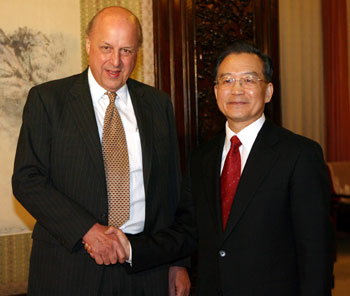Leaders share consensus on Taiwan
Updated: 2008-01-17 07:36
China sees the Taiwan question as a particularly sensitive issue that must be treated carefully, Premier Wen Jiabao told visiting US Deputy Secretary of State John Negroponte Wednesday.
 Premier Wen Jiabao meets with visiting US Deputy Secretary of State John Negroponte in Beijing Wednesday. [Xinhua] |
"The two sides should through mechanisms like the China-US Strategic Dialogue handle certain sensitive issues properly, with the Taiwan question in particular, to ensure long-term, healthy and stable development of China-US constructive and cooperative relations," Wen said at a meeting with Negroponte, who arrived ahead of the fifth round of Strategic Dialogue, a platform designed to communicate on strategic issues.
Negroponte said the US position is clear as it has repeatedly expressed opposition to the Taiwan authorities' plan of a referendum on membership of the United Nations.
Foreign Minister Yang Jiechi had another meeting with Negroponte later Wednesday. Yang said that under current circumstances, more resolute opposition to Taiwan authorities' separatist activities is extremely important to the peace and stability across the Taiwan Straits as well as to the relationship between China and the United States.
Negroponte is scheduled to leave Beijing today for the southwestern city of Guiyang, where he will co-chair the semi-annual China-US Strategic Dialogue with Chinese Deputy Foreign Minister Dai Bingguo.
Tensions over Taiwan authorities' planned referendum are definitely a key in Negroponte's talks with Chinese officials, analysts said.
Beijing has seen a relay of visits in recent weeks by senior US officials with clout on Taiwan-related affairs, including Secretary of Defense Robert Gates and chief of US Pacific Command Timothy Keating. Such intensive visits are "by no means fortuitous", said Gong Li, deputy director of the Institute of International and Strategic Studies under the Party School of the Central Committee of CPC.
"Both China and the United States have recognized the year 2008 is a highly dangerous period for the situation across the Taiwan Straits. Chinese leaders' position on Taiwan is firm, whereas Washington can also feel the stress as the presidential election on the island approaches," Gong told China Daily.
Although the recent victory of the opposition Kuomingtang party in Taiwan's "legislative election" could help reduce the likelihood of a showdown across the Straits, the possibility that Chen Shui-bian keeps making trouble and escalating tensions cannot be ruled out, he said.
"Through the dialogue, the US side may hope to see the cards in China's hand and figure out how China will respond if certain circumstances occur," said Gong.
Aside from Taiwan, the Iran nuclear issue is widely tipped as another main topic of the dialogue, as the five permanent members of UN Security Council and Germany will meet in Berlin next week over possible new sanctions against Iran.
"The Iran nuclear issue is a very likely topic in the strategic dialogue, as the Bush administration, under great pressure after a CIA report found no proof of Iran developing nuclear weapons, would seek China's cooperation in the upcoming meeting in Berlin," Hua Liming, former Chinese ambassador to Iran, told China Daily.
But he said the result of the Berlin meeting was "hard to predict" as China would not favor the use of force despite its convergence with Washington on prevention of nuclear proliferation.
"Judging from the consistent position of the Chinese government, it is hard to imagine China will fully satisfy demands from the United States," Hua said.
|
|
|
||
|
||
|
|
|
|